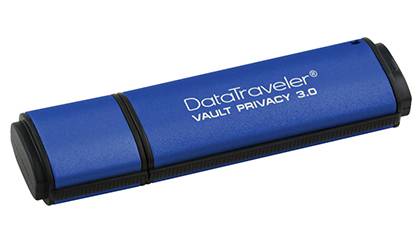Secure Flash Drives Available at Duke Stores
New version of the portable device prevents access to lost or stolen data

Is your flash drive secure?
If you use a USB flash drive that is not password protected, you might want to consider purchasing a secure drive, now available in the Duke Computer Store.
“Flash drives are easily lost or stolen, and without encryption, anyone can view or take information from that flash drive,” said Kevin Davis, global services program director at the Office of Information Technology (OIT). “We also hear of travelers picking up computer viruses through flash drives.”
The Duke Computer Store in the Bryan Center sells the Kingston DataTraveler Vault Privacy 3.0 USB drive, which has been tested by OIT and is suitable for many types of work. The secure flash drives, which start at $24.99 and range in size from 4 to 64 gigabytes, encrypt, or scramble, information it contains and requires a password to access the data.
Dorothy Coletta, who provides desktop support at Bostock Library, plans to provide the new flash drives to library staff and faculty who do not have a portable laptop computer or are unsure about networking while traveling. She tested the flash drives and appreciates their flexibility.
“It’s so easy and convenient. It was easy to set up,” she said. “I plugged it into my laptop, clicked the Kingston icon to launch it and logged in.”
In general, OIT encourages Duke community members to use secure file storage options like Duke Box cloud storage or their department’s file server accessed through a virtual private network (VPN) instead of flash drives. However, there are times when those options are not possible.
“In those cases, a secure flash drive can be a good alternative,” Davis said.
You may benefit from a secure flash drive if you are:
- Accessing work on another computer (for instance, using a flash drive to give a presentation on a shared computer).
- Transferring data from one location to another where no network or Internet connection is available.
- Storing or backing up files during field work or travel where reliable Internet access is not possible.
Faculty or staff with questions on whether the Kingston drive is secure enough for their type of data should contact the Duke IT Security Office at security@duke.edu for recommendations.